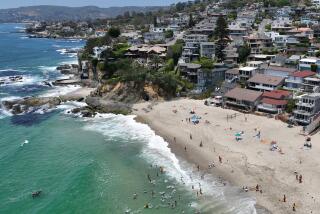Leader’s departure marks end of an era for Coastal Commission
- Share via
The California Coastal Commission is losing the leader who has guided it for a generation, casting uncertainty over the direction of the powerful agency responsible for guarding the state’s treasured coastline.
Peter Douglas, 68, who has been fighting lung cancer since last spring, announced this week that he would go on sick leave Monday and will retire in November after 26 years as executive director. He said he planned to hand off leadership to Senior Deputy Director Charles Lester.
Douglas, an aggressive opponent of development, is widely recognized as the muscle behind the nation’s strongest coastal protection law. He built the Coastal Commission into an influential land-use agency that is not shy about exercising its authority over development and public access to the shoreline and that is credited with keeping much of the state’s 1,100-mile coastline undeveloped.
His departure marks the end of an era and leaves many wondering how regulation of coastal development might change in his absence. It is ultimately up to the 12-member panel to choose a new leader, and staffers are not ruling out an outside recruit who could weaken the commission’s clout.
“At this point, the name Peter Douglas and the Coastal Commission are synonymous: it’s almost impossible to picture one without the other,” said Sarah Christie, the agency’s legislative director. “It’s more than a retirement, it’s like an amputation, and the post-operative care is going to be critical.”
Douglas, known for wearing bolo ties and a bristly beard and driving a vegetable oil-powered Mercedes-Benz, was born in Berlin in 1942. His family fled the Nazis and immigrated to the U.S. from Mexico in the 1950s.
He began his career in the 1970s as an attorney, legislative aide and consultant, helping to draft Proposition 20, which created the commission and was passed in 1972, and the 1976 state Coastal Act, which made the commission permanent. After serving as the agency’s chief deputy, he was named its third executive director in 1985.
Under Douglas, the agency became a battleground where the interests of developers and wealthy homeowners often clashed with public access and conservation concerns on projects such as single-family homes, docks, beach stairways, subdivisions, marinas, highways and power plants.
“Our greatest achievements are the things you don’t see,” Douglas told the panel when announcing his retirement. “It’s the wetlands that haven’t been filled, it’s the access that hasn’t been lost, it’s the agricultural lands that haven’t been converted. It’s the highly scenic and environmentally sensitive habitat areas that haven’t been spoiled or destroyed.”
Douglas is beloved by environmentalists, who see him as “the heart and soul” of California’s efforts to protect its coast, said Annie Notthoff, director of California advocacy for the Natural Resources Defense Council.
But Douglas also has been a lightning rod for developers and property owners who have fought his heavy hand in regulating beachside projects and public access to the shoreline. Cities and counties have often clashed with Douglas over his agency’s challenges to what they consider local matters, such as beach curfews, beach pathways and parking restrictions. He has served under Democratic and Republican governors and survived a number of attempts at ousting him.
In an interview Friday, Douglas said his retirement was “disease driven, there’s no question about it. I just don’t have the energy anymore.” He expects critics to push for a successor from the outside who would be less hard-nosed about enforcing the Coastal Act but said that would be a mistake.
“I don’t care how smart you are and how much you’ve got going for you,” he said. “You’ve got to have someone with a working knowledge of the law, and that’s very hard to do when you come from the outside.”
Paul Beard, an attorney for the Pacific Legal Foundation, a conservative legal advocacy group that is one of the agency’s most frequent adversaries in court, said that under Douglas the agency “has been driven by this very radical environmentalist ideology. We hope a successor would be more pragmatic and more respectful of property rights.”
Yet even those who often disagreed with Douglas see his unmistakable hand in the open spaces along the California coastline.
“All you have to do is drive from San Francisco to L.A. and ask yourself, how the heck did we do this?” said Steve Blank, a retired Silicon Valley entrepreneur appointed to the commission by Gov. Arnold Schwarzenegger. “It doesn’t take bad planning or bad decisions to have a billboard or hotel every 100 yards. Instead, it takes a consistent view of what the Coastal Act says, and in doing so Peter brought down the wrath of everybody who believed otherwise.”
More to Read
Sign up for Essential California
The most important California stories and recommendations in your inbox every morning.
You may occasionally receive promotional content from the Los Angeles Times.











